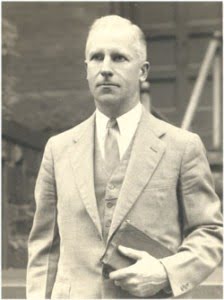It apparently began with Anglican scholar, W. H. Griffith Thomas and his trip to China in the summer of 1920. Upon his return, he gave an address before the Philadelphia Presbytery, charging that the PCUSA was sending modernists onto the mission field in China, and that what was being taught on the mission field was heretical. After an initial flurry of debate, countercharges and reassurances, the matter seemed to die down somewhat. But it continued to boil under the surface.
Jumping ahead to 1933, conservatives in the Presbyterian Church, U.S.A. had by that time decided their only option was to establish an Independent Board for Presbyterian Foreign Missions, which was officially organized in October of that year. Dr. J. Gresham Machen was elected to serve as the first president of the newly formed missions board. The plan was that this Board would allow conservatives to support theologically orthodox missionaries and know that their contributions were used in a way that would honor the Lord.
But about that same time, the New Brunswick Presbytery, of which Machen was a member, moved to tighten its requirements for men coming to be ordained. Henceforth they would require candidates to affirm their sole support for the Boards and ministries of the denomination. Machen opposed this move, but in the end, the matter turned disastrously against Dr. Machen and all those involved with the Independent Board, for the denomination essentially affirmed and adopted the New Brunswick position. Subsequently an order came down from General Assembly in 1934 that members must support the programs of the Church and no others.
The result of this “Deliverance of 1934” was that, as a matter of conscience, Machen and a dozen or so others refused to step away from their involvement with the Independent Board, and as a result were tried in ecclesiastical court. In each case, they lost. Dr. Machen’s case was particularly grievous, in that he was not allowed to present evidence that would have supported his position.
 It was on this day, March 5th, in 1936, that the Rev. Harold S. Laird pled “not guilty” to the charges against him for his involvement with the Independent Board. Rev. Laird was the pastor of the First and Central Presbyterian Church in Wilmington, Delaware. He had been charged with “disobedience to the government and discipline of the Presbyterian Church in the U.S.A.” Initially there had been two other charges, that (2) he had failed to subject himself to his brethren, and (3) that he had failed to be zealous and faithful in maintaining the truths of the Gospel. But Rev. Laird’s character was beyond reproach, and those charges were foolish at best, so the matter was reduced to the one charge their rules could sustain.
It was on this day, March 5th, in 1936, that the Rev. Harold S. Laird pled “not guilty” to the charges against him for his involvement with the Independent Board. Rev. Laird was the pastor of the First and Central Presbyterian Church in Wilmington, Delaware. He had been charged with “disobedience to the government and discipline of the Presbyterian Church in the U.S.A.” Initially there had been two other charges, that (2) he had failed to subject himself to his brethren, and (3) that he had failed to be zealous and faithful in maintaining the truths of the Gospel. But Rev. Laird’s character was beyond reproach, and those charges were foolish at best, so the matter was reduced to the one charge their rules could sustain.
Pictured at right, the Rev. Harold S. Laird.
Words to Live By:
Eventually Machen, Laird, Buswell, McIntire, Bennett and about eight others all lost their trials. One result was the formation of the Presbyterian Church of America in 1936, later renamed the Orthodox Presbyterian Church. The Independent Board for Presbyterian Foreign Missions also continues to this day with its ministry. Those who were tried were men and women of good conscience, who would not step back from what they knew was right as they sought to serve the Lord. Those of us today who would stand for the truth of the Scriptures and not step away, must first prepare. Your resolve in public depends completely upon your resolve in private. If you are not living a faithful life before the Lord in private, now is the time to prepare. Go to Him daily in humble repentance and seek His face. When your life is honest and forthright in private before the Lord, then He will enable you to stand honest and forthright in your public witness.
For Further Study:
W. H. Griffith Thomas, “Modernism in China,” Princeton Theological Review 19.4 (October 1921): 630-671. Reprinted as Modernism in China. Philadelphia: The Sunday School Times, n.d. To read this article, click here.
